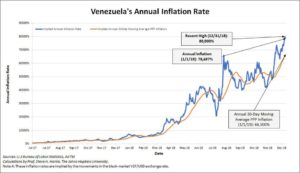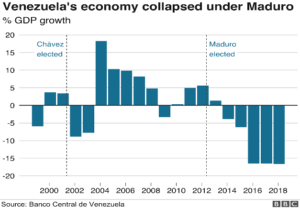The Venezuela crisis: Foreign aid, social cohesion and economic resilience
The world watches anxiously as one of the worst economic and humanitarian crisis in modern history unfolds in Venezuela. For years, the South American country has experienced a downward spiral of mounting political unrest fueled by skyrocketing hyperinflation, food shortages and economic contraction. Although his predecessor Hugo Chaves initiated the crisis, Nicolás Maduro exacerbated it during his first term in office – sending the Venezuelan economy into freefall in 2013.

According to BBC, many Venezuelans blame Maduro and his socialist policies for the country’s decline. A study published by Professor Steve Hanke of Johns Hopkins University paints a grim picture of the Venezuelan economy, reporting that the annual inflation rate reached 80,000%/yr in the 12 months prior to November 2018. By December of the same year, prices were doubling every 19 days on average. Overall, Venezuela’s economy has contracted by 35% since 2013 – a larger drop than the United States experienced during the Great Depression. As a result, many Venezuelans struggle to afford basic necessities. Although years in the making, the crisis recently escalated due to new sanctions introduced by the Trump Administration in late January. Targeting crude oil from Venezuela’s PDVSA – the country’s largest source of revenue – the sanctions attempt to bar Nicolás Maduro’s access to oil revenue, which has enabled his administration to stay in power since 2013. Previously, the US took action against Maduro by freezing his US assets and restricting Venezuela’s access to US markets. Despite stockpiles of US and foreign aid waiting at the Colombian and Brazilian borders, Maduro remains resistant, claiming the aid is an imperialist tactic and blaming the US for perpetuating the crisis.

In the face of massive amounts of hyperinflation and currency shortages that worsen on a daily basis, the Venezuelan people display remarkable economic resiliency in their inventive efforts to stay afloat and maintain the social fabric of their communities. The lack of sufficient currency due to inflated prices has led to the adoption of local barter economies, as well as an increase in cryptocurrency investments in Bitcoin. According to CNBC, the amount of Bitcoin traded in Venezuela soared by 30% to 2,454 bitcoins in the last week alone. In USD, that is equivalent to approximately $8.95 million per week and $1.29 million per day. The dramatic increase illustrates Venezuelans’ greater trust in cryptocurrency than the Venezuelan Bolivar as the economic situation deteriorates. Venezuelans have also begun to barter with neighbors for basic necessities in order to keep the economy afloat. Payment for even the most basic of transactions would require burdensome amounts of currency, and many have instead resorted to accepting and giving food as payment, particularly in coastal communities where fresh fish is abundant.
As the crisis spirals by the day, Venezuelans that choose to stay must constantly seek new survival methods and foster resilience in their communities without aid from their government or the US.
Sources and Readings:
Venezuela crisis: How the political situation escalated – BBC
Venezuela’s Nicolás Maduro: Dictator or defender of socialism? – BBC
Venezuela’s Economic Crisis: Issues for Congress – Congressional Research Service
Venezuela: All you need to know about the crisis in nine charts – BBC
Venezuela’s Hyperinflation Hits 80,000% Per Year in 2018 – Forbes
Venezuela crisis: Juan Guaidó vows to bring in aid – BBC
Venezuela crisis: Aid still blocked in high-stakes power struggle – Al Jazeera
Bitcoin trading in crisis-stricken Venezuela has just hit an all-time high – CNBC
Fish for Flour? Barter is the new currency in collapsing Venezuela – Reuters
